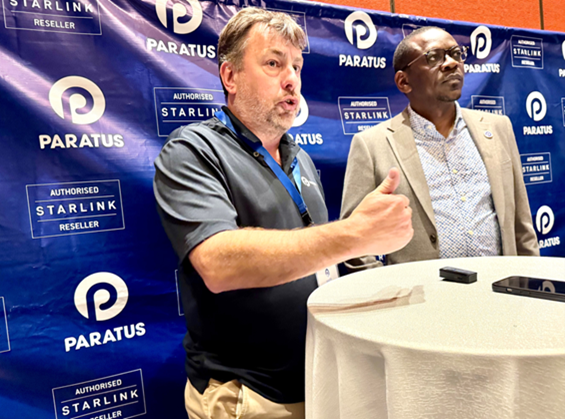10 September 2025
Martin Cox, Chief Commercial Officer at Paratus Group & Joseph Kibwott, MD of Paratus Kenya at the launch of Paratus Kenya
Since November 2024, Paratus Kenya has been operating as a licensed internet service provider (ISP) and authorized Starlink reseller, offering vital digital services to local customers. Rwanda and Uganda have recently launched as ISPs, with Rwanda also providing Starlink services, further broadening the Group’s footprint. Tanzania joined the network in 2025, delivering ISP services to enterprise and wholesale clients nationwide. Across these four countries, Paratus is supporting sectors including retail, transportation, logistics, education, health, and tourism, ensuring that both businesses and communities have access to secure and scalable connectivity.
The Group’s East–West fiber route is central to its expansion, creating a terrestrial backbone stretching from Maputo in the east to Swakopmund in the west. This route interconnects with the Equiano subsea cable, providing low-latency, high-capacity redundancy between Africa and Europe, enhancing regional connectivity and resilience. While East Africa currently contributes roughly 18% of Africa’s total GDP, forecasts from Euromonitor suggest that this figure could rise to 29% by 2040, driven by increased services, infrastructure development, foreign investment, and regional integration. Building reliable digital infrastructure has become a top priority in the region’s economic strategy.
With over 200 million people and a combined GDP exceeding $200 billion, East Africa is emerging as a key market for future growth. Industry sectors such as agriculture, mining, manufacturing, energy, ICT, healthcare, and infrastructure are benefiting from policy reforms and increased foreign investment. The region’s youthful population is also fueling demand for modern digital services and products. From Kenya’s burgeoning fintech industry and Tanzania’s industrial corridor to Rwanda’s digital transformation initiatives, Paratus is positioned to meet the rising demand for secure, high-performance connectivity, cloud services, and data solutions.
“Our network and infrastructure enable enterprise and wholesale customers to access reliable, cross-border connectivity within the region and beyond, supporting their digital operations and growth,” said Martin Cox, Chief Commercial Officer at Paratus Group. He added that the company’s range of services, including dedicated internet access, cloud solutions, managed networks, and cybersecurity, provides the essential digital foundation for East Africa’s economic expansion.
“You can’t trade if you can’t connect. We’re providing the infrastructure and delivering 24/7 connectivity across borders to enable businesses to thrive in the digital age. Our role in building East Africa’s digital highways is as vital today as the traditional trade routes were centuries ago. Trade is in the DNA of the region, and the key to unlocking it now lies in digital transformation and capabilities,” said Cox.
He further noted that Paratus is not only expanding its footprint but also helping East Africa reclaim its role as a major global trade gateway through secure, world-class digital infrastructure.
“The same geographic advantages that made cities like Mombasa important centuries ago remain relevant today, but now they must be supported by top-tier digital connectivity,” Cox said.
This expansion reaffirms Paratus Group’s reputation as Africa’s ‘Quality Network,’ designed to meet the demands of a rapidly digitalizing continent. The company’s efforts aim to bring comprehensive connectivity to as many people and enterprises as possible across sub-Equatorial Africa, supporting the region’s broader economic ambitions.







